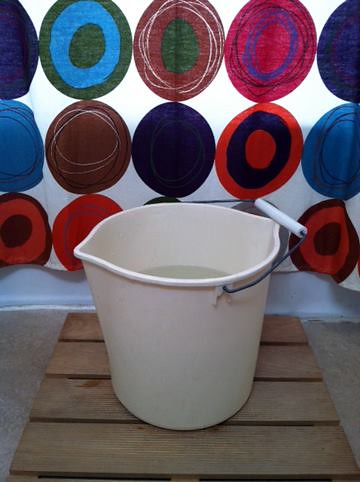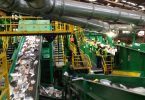In light of California’s historic drought and Governor Brown’s executive order to impose a 25 percent reduction on municipal water use, my partner and I thought about ways we can conserve more water than we already do.
The “problem” we have is that like many long-time California residents who have been through droughts before, water awareness and conservation is very much ingrained in our daily routines. We don’t flush the toilet unless necessary (and have a low-flow toilet), we don’t have house plants that need watering, we don’t take showers every day (and keep them short when we do), and the three sources of water in our apartment are equipped with low-flow faucets (provided for free by the SF PUC!). The one in our kitchen sink even has a convenient switch to cut off water during dish-doing unless you absolutely need it.


After some brainstorming — including a wee bit of righteous indignation about how this mandatory 25% cut shouldn’t really apply to those of us who have been tightening our faucets all along — we discovered a weak spot in our system:
Living on the 2nd floor of an old building where the water heater is in the garage means that it takes quite a while for warm water to move up through the pipes. While that’s not a big issue in the kitchen sink (plates and utensils are pretty immune to cold-water shock) or bathroom sink (no problem washing your hands or brushing your teeth with cold water), the shower is a different story. Despite my overlapping cultural heritage with the purveyors of the Kneipp therapy, I prefer to keep my full-body cold water exposure to the hottest days of the year, of which we don’t have that many in foggy San Francisco.
Thus our decision, starting today, to capture the initial stream of cold shower water with a bucket.
This water, though not suited for drinking, can now be used for a variety of purposes, like flushing the toilet, doing the dishes, or watering our landlady’s potted plants. And voila, we may be a step closer to squeezing out 25% more savings on our water tab!
Now, I can hear the voices all around me, including the ones in my head, screaming in bloody cynical unison:
“You are fooling yourself, thinking your little exercise is going to make one iota of difference.
Don’t you know that…
…the 9 million acres of irrigated farmland in California are using up 80 percent of the water?…almost half of all California water goes to cows?
…your measly shower bucket is worth about one friggin’ almond?
Why is the Governor asking us to parch ourselves when Big Ag is getting a free ride on the water slide?
What’s the point of savoring little drops while Nestlé is draining California aquifers to the tune of 80 million gallons annually?”
Gee, I need a drink just thinking these thoughts!
But here’s the deal, and I’ve said this plenty of times before in the old “your efficient light bulb won’t save the planet” discussion: We can do both!
Really, it’s not that hard to point out systemic problems and inequities, work towards creating better policies, AND make personal changes. That bucket in my shower is not in the least keeping me from writing letters to my representatives, getting involved in advocacy groups, or posting my grand ideas for a better world right here in these fiber optic interwebs.
More importantly, making these personal changes makes us think more deeply about the larger issues and how they affect our personal lives, as well as the lives of others. They spark ideas that lead to conversations, online and in real life, with people who may not have thought about things in certain ways and might become interested in finding their own solutions.
These dialogs in turn create the kind of lightbulbs in our heads that then go off the next time we hear about policy discussions that never meant anything to us previously because it didn’t seem to affect us in any way. What sounded like boring bureaucracy speak all of a sudden becomes a hot topic, and all of a sudden things that were always decided in half-empty board- and city hall rooms are now under popular scrutiny. Before you know it, there’ll be an outbreak of democracy, incited by people who got their plumbing fixed.
And that, my friends, is why it’s worth saving your drops in a bucket. Or, in the words of a pretty cool Indian philosopher, be the change you wish to see in the world.









Hi Sven, I love how you’re approaching this topic of individual agency. We’ve been having a dialog on my blog about exactly this: do we have agency? If so, why aren’t we effective in changing the course of our history? Why can’t we slow down, if not stop, the march of Capitalism and consumerism? Why can’t we this or that? There are some who think we don’t have agency at all, then some who think we have some but it’s largely worthless in this day and age of centralization or power and control, and some who think anything is possible if only enough of us who want to get something done actually go ahead and try it. It’s the only way anything ever has actually happened so far. A good example is the way the Bodega Bay nuclear power plant was stopped dead in its tracks in the early 60s. They dug up the ground and were ready to pour the foundation. It’s now a duck pond. Because a few people who cared got together and did something.
Your analysis is right on… in order to do anything at the collective level, we should first try and relate to it at the personal or individual level. It has to be personal first, then on to the community level, to the regional level onward and outward.
Like the nuclear plant problem, the water problem is ideally suitable for an all-out approach that you describe, it’s at once local as well as regional as well as personal. If we realized how interconnected we are, how everything out there affects everything in here and vice versa, we’d see that all our problems are exactly like this: at once individual and collective.
Thanks for the essay! I’m going to tell a few people about it now.
Hi Satish, thanks for stopping by. I think it has to be a little of everything, and each one of us to the best of our capabilities. If there’s one thing everyone can agree on, it’s that there’s no quick or one-size-fits-all fix. In a sense, that’s what all the industrial complexes have tried to do and it’s clear that those models have failed when taken in any kind of long-term context. So, without getting too attached to any outcome, I think the best each of us can do is to be as nimble and diversified in our solutionary approaches, engaging on personal, community, as well as global levels, connecting the dots and thinking in terms of whole systems as much as possible.
I’ve really been enjoying your posts Satish, and I’m so happy to see your writing getting the great resonance it deserves. For anyone reading this, please make sure to add Going Kuku to your blogroll!
Sven, your practice is a must for ocean crossing small yachts. Save every drop & re-use grey water at sea. I’m a nuclear engineer working on reactor cooling problems. Talking with SATISH and shocked to read here how he is opening up to the idea that people can still make active changes…same way public effort has done most everything in history. All leaders were born by some mother. Rich or poor it’s a choice to be defeated or attempt to take a stand.
Thanks for chiming in, Mark. I love Satish’s writing and appreciate his general openness and evolution of thought. While I’m not sure that making those personal active changes will “save” the world, they are at least one big component in moving towards a more sustainable path. So there’s nothing to lose.